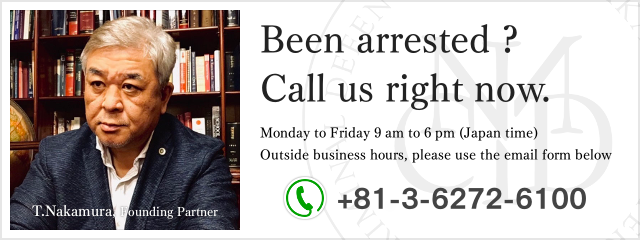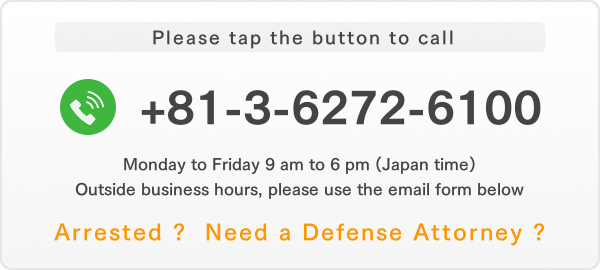Contents
Arrest
Q: What happens when I get arrested in Japan?
A: If it is an arrest by a warrant, the police will show you the warrant. If you are arrested on the spot, there will be no warrant, but they will tell you the reason for the arrest. After you are arrested, you will be taken to the police station. The police will state the charge(s) for the record and inform you of your right to hire an attorney. Then, the police will listen to your explanation regarding the charge(s) and make a written statement. If the police decide to keep you in custody, they must send you to the prosecutor’s office within 48 hours of your arrest. If you are sent to the prosecutor’s office, the prosecutor will again hear your explanation and make a written statement. If the prosecutor decides to keep you in custody, he/she will request permission from the judge to detain you. If the judge decides that you meet the requirements for detention, you will be detained.
Detention
Q: What happens when I get detained in Japan?
A: You will be kept in custody for 10 days including the day that the prosecutor requested detention. Detention can be extended to another 10 days at the most if the prosecutor asks for an extension and the judge grants it. In most cases, the prosecutor will decide whether to indict you or not by the end of the 20-day detention period.
Q: Can I request bail during my detention period?
A: You cannot request bail during the detention period before your indictment. Therefore, if you are detained in Japan, you may be kept in custody for a maximum of 23 days without bail.
Q: When I am detained in Japan, when and how long can my family visit me?
A: Your family can visit you only on weekdays between 9 am to 5 pm. The time of visitation is restricted to 15 minutes and a police officer will be present to monitor your conversation. Only one visit is allowed per day, although family members may visit as a group. However, the court can restrict visitation in such cases as when there is an accomplice in the crime you are accused of. Then, only an attorney can visit you. There are no restriction for your attorney and the visit will not be supervised by police officers.
Q: Can my family send me food and medicine while I am detained?
A: No. In Japan, family members may not send food or medicine to the detention facility. However, you can get money from your family and you can buy certain products on a list. They can also send certain clothes and books.
Q: What do I do if I need certain kinds of medicine, but the police do not understand or do not allow me to have any?
A: You should do your best to inform the police, and failing that, make sure you tell your attorney about any medication you need to take.
Q: When my family visits me at a detention facility in Japan, can we communicate in our native language?
A: In most cases, no. During a family visit, a police officer will be present. The officer must be able to understand the conversation between you and your family. If he/she can understand your native language or if your family prepares a translator, you can communicate in your native language.
Q: Will I continue to be detained even after my indictment?
A: In Japan, if you are being detained at the time of the indictment, your detention will continue automatically unless bail is granted. If bail is granted, you will not be kept in custody.
Bail
Q: Do I have a right to get bail in Japan?
A: The law says you are allowed to have bail. However, it is both very rare and very expensive.
Q: How much is bail in Japan?
A: It depends on your case, but in most cases, bail is between 1 and 3 million yen. In cases of fraud or embezzlement, bail can be over 10 million yen. If you do not have enough money for bail, there is an institution that can lend you money for a certain fee, which is usually around 100,000 yen.
Immigration
Q: What happens if I am already overstaying my visit in Japan when I am granted bail?
A: You will be taken into custody at the Immigration Bureau. If you are granted provisional release from the Bureau, you will be released. You will need to pay a deposit of 3 million yen at the most. Your attorney can work to gain provisional release.
Interrogation
Q: Can an attorney accompany me during police or prosecutorial interrogation?
A: In Japan, if you are under arrest or detention, attorneys are not allowed to be present during interrogation. If you are not being held at any detention center, the police may allow an attorney to be with you while they interrogate you, but it depends on the discretion of the police. However, in cases where you have been brought in as a suspect but have not yet been arrested, you are not obliged to go to any interrogation; therefore, you may leave whenever you want. If the police does not allow you to leave, it is illegal and you must contact your attorney. However, if you do not cooperate with the investigation of the police, there is a chance that the police may get a warrant to arrest you.
Q: If an attorney cannot accompany me during interrogation, what can he/she do to help me?
A: When you are not being interrogated, an attorney may visit you at the police station and give you advice on how to respond during the interrogation. An attorney can also send you a booklet called “Suspect’s Notes,” which can be used to record what happened during the interrogation. It can be used as evidence in court to challenge the admissibility of your written statement. It also outlines precautions and your rights in English, in case you are not familiar with the Japanese criminal system.
Q: If I refuse to answer the police interrogators, will they stop interrogating me?
A: No, they will not stop interrogating you. In Japan, the right to remain silent is treated in a different manner as the obligation to be present at interrogation. You may choose to remain silent, but the police or prosecutor may continue asking you questions.
Trial
Q: As an attorney, can you make a plea bargain for me?
A: No. There is no such system as plea bargaining in Japan, though it is currently under review and may be available in the future.
Settlement
Q: If I make a settlement with the victim by paying him/her money, will that influence my indictment or my final sentence?
A: Yes, it will influence your indictment greatly, especially in cases of rape or indecent assault. In Japan, the prosecutor must have the complaint from the victim in order to try a rape or indecent assault case. If you make a settlement with the victim and ask him/her to withdraw the complaint, the prosecutor cannot indict you. Since a complaint cannot be withdrawn after the indictment, you cannot avoid trial once the prosecutor indicts you, even if you negotiate a settlement with the victim after the trial begins. However, even after the trial has begun, it will greatly affect your final sentence if you come to a settlement, as it may give you a higher chance of earning a suspended sentence.
Written Statement
Q: Is a written statement an important piece of evidence in Court?
A: Yes, it will be treated as an important piece of evidence, especially those that are produced by the prosecutor. If you do not agree with anything in the written statement presented by the police/prosecutor, do not sign it. If you do not sign it, it will be inadmissible as evidence.
If you sign a written statement, it will be used against you as evidence in Court. Because of the gravity of this piece of evidence, it is crucial to hire an attorney when in custody so that he/she can advise on how to respond during the prosecutor’s interrogation. The written statement will be written in Japanese, even if the suspect cannot read Japanese. A translator will be available to tell you what is written before you sign it, but because the translation will not be recorded and a written translation will not be attached, there is no means in Court to assess the accuracy of the translation.
Q: If I sign a statement, will I be released from detention until trial?
A: No, signing a statement does not give you reason to leave detention.
Q: Should I sign a statement if the prosecutor and/or police tell me that I will not receive a jail term; or I will not be indicted; or I will receive only a fine and/or a suspended sentence if I sign it?
A: No. You should not sign anything based on any promises or deals that the police offer. The police have no authority to decide whether you will be indicted, nor what your sentence will be.
The prosecutor may suggest some course of action, but there is no guarantee he/she will keep their promise.
If you have signed any document, you should immediately inform your attorney because any document signed on the basis of a promise or deal for a lower sentence would be grounds for dismissal in Court in Japan.
Drug Related Crimes
Q: What will be my sentence if I imported drugs into Japan?
A: It depends on what you imported.
Under Japanese law, if it is a stimulant drug, the sentence will be 1-20 years in prison. If the amount is large and if the drugs were for commercial purposes, the sentence will be more than 3 years in prison and a fine of less than 10 million yen.
If it is cannabis, the sentence will be less than 7 years in prison. If it were for commercial purposes, the sentence will be less than 10 years in prison and a fine of less than 3 million yen.
If it is cocaine, the sentence will be 1-10 years in prison. If it were for commercial purposes, 1-20 years in prison and a fine of less than 5 million yen.
Deportation
Q: Will I be deported from Japan if I am found guilty?
A: It depends on the crime. You will be deported from Japan if you get a prison sentence of more than 1 year without a suspended sentence. If you are a mid- or long-term resident with a visa in Japan and you are found guilty of certain crimes, such as property offences or violent crimes, you will be deported if you get any prison sentence, regardless of the term and/or the suspension of the sentence. If you are found guilty in a drug-related case, you will be deported from Japan, regardless of the punishment. You should consult an attorney for more detailed information.
Q: Is there any way to avoid deportation from Japan?
A: You can avoid deportation if you are granted Special Case Determinations by the Minister of Justice. The Special Case Determinations are granted if you have family residing in Japan. You should hire an attorney to apply for the Special Case Determinations.
















